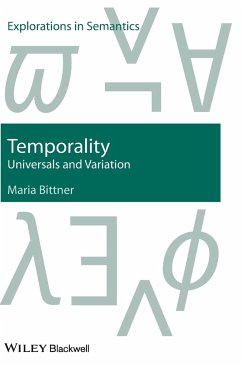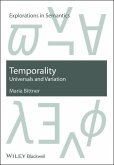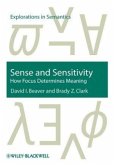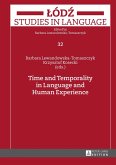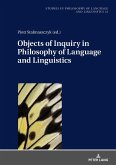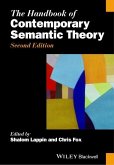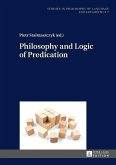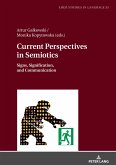Temporality surveys the ways in which languages of different types refer to past, present, and future events, through an in-depth examination of four major language types: tense-based English, tense-aspect-based Polish, aspect-based Chinese, and mood-based Kalaallisut.
Cutting-edge research on directly compositional dynamic semantics of languages with and without grammatical tense
New in-depth analysis of temporal, aspectual, modal, as well as nominal discourse reference
Presents a novel logical language for representing linguistic meaning (Update with Centering)
Develops a unified theory of tense, aspect, mood, and person as different types of 'grammatical centering systems'
Hinweis: Dieser Artikel kann nur an eine deutsche Lieferadresse ausgeliefert werden.
Cutting-edge research on directly compositional dynamic semantics of languages with and without grammatical tense
New in-depth analysis of temporal, aspectual, modal, as well as nominal discourse reference
Presents a novel logical language for representing linguistic meaning (Update with Centering)
Develops a unified theory of tense, aspect, mood, and person as different types of 'grammatical centering systems'
Hinweis: Dieser Artikel kann nur an eine deutsche Lieferadresse ausgeliefert werden.
"By combining a genuinely non-partisan perspective on human languages with uncompromising formal rigor, Maria Bittner succeeds in separating what is particular to individual languages from what is truly universal to human language and thought. An unparalleled achievement and a milestone in the history of semantics."
-Hans Kamp, University of Stuttgart, Germany
"Bittner combines insightful linguistic analysis of four very different languages with the construction of a logic, Update with Centering, tailored to their varied semantic and referential needs, and the definition of a grammar formalism according to which logical forms can be constructed compositionally directly from the surface forms of their sentences in context. Her book is a shining example of linguistics as a cognitive science, and will be read by computer scientists, psychologists, and linguists."
-Mark Steedman, University of Edinburgh, U
-Hans Kamp, University of Stuttgart, Germany
"Bittner combines insightful linguistic analysis of four very different languages with the construction of a logic, Update with Centering, tailored to their varied semantic and referential needs, and the definition of a grammar formalism according to which logical forms can be constructed compositionally directly from the surface forms of their sentences in context. Her book is a shining example of linguistics as a cognitive science, and will be read by computer scientists, psychologists, and linguists."
-Mark Steedman, University of Edinburgh, U

